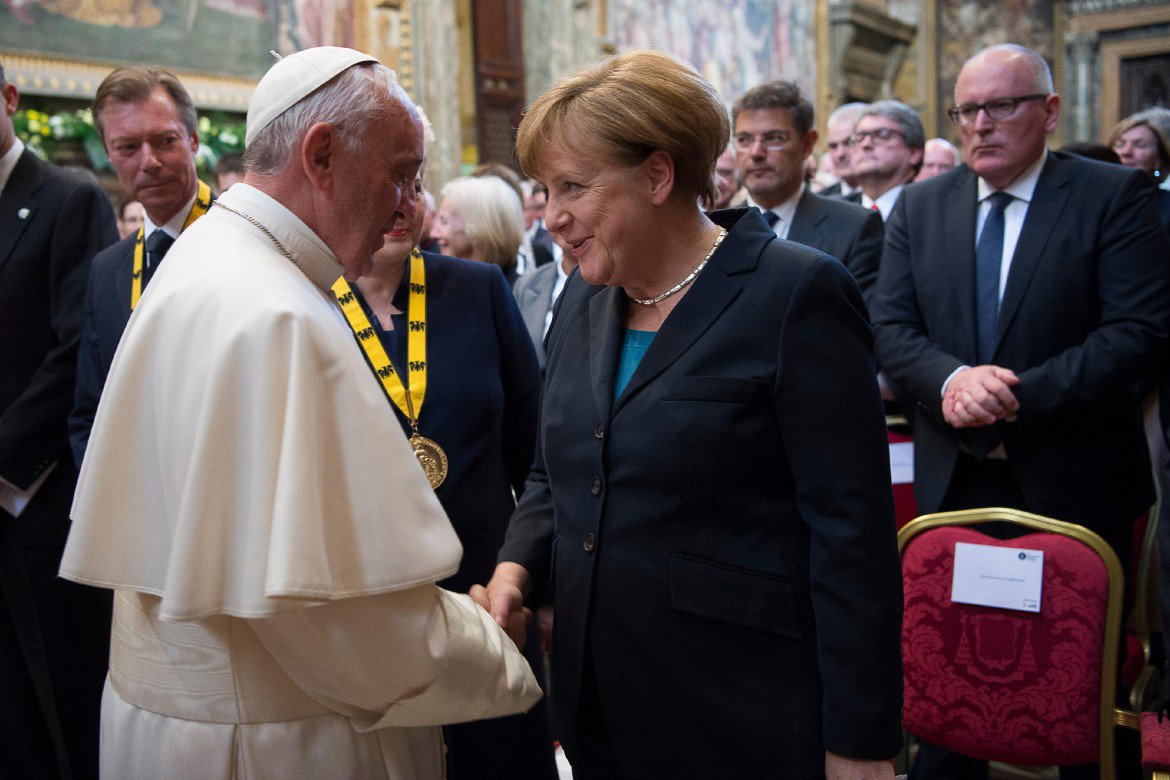Europe
Pope Francis scolds European leaders as he receives Charlemagne Prize
In receiving the Charlemagne Prize, Pope Francis took the opportunity to chastise the gathered European leaders for criminalizing migration.

“I dream of a Europe where being a migrant is not a crime,” rather than what exists today, which is a Europe building “walls” and “trenches” around itself.
With these words, Pope Francis greeted European leaders who rushed to the Vatican on Friday to attend the pontiff’s reception of the international “Charlemagne” prize, the recognition bestowed every year in the city of Aachen — where the emperors of the Holy Roman Empire were crowned and where the remains of Charlemagne, the first “European” emperor, are buried in the cathedral — to individuals who excel in furthering European values. The decision to give the award to Bergoglio was based on his “extraordinary commitment to peace, understanding and mercy in a European society of values.”
In his acceptance speech, Francis compared Europe to a barren grandma, “tired and aged,” reviving an expression he had used during his visit to the European Parliament in Strasbourg in November 2014. A Europe that has lost the “high ideals” of its founders — he quoted Schuman and De Gasperi, but not Altiero Spinelli — “a Europe tempted to secure and dominate spaces rather than create a processes of inclusion and transformation,” a Europe “that is building trenches instead of favoring actions that promote new energies in the society.”
In the front row were all the leaders of the “Fortress Europe”: the European Parliament President Schulz, the European Commission President Juncker, the president of the European Council Tusk, the E.U. High Representative for Foreign Affairs and Security Policies Mogherini, next the German Chancellor Merkel, Felipe VI of Spain, Renzi, Draghi. Addressing them directly, the Pope noted that it seems Europe is moving away from “the enlightened project designed by the founders” and instead giving way to “selfishness, looking out for its own interests and thinking of building private enclosures.”
“Europe is the home of human rights, and anyone who sets foot on European soil should be able to experience them,” Francis said last month at the island of Lesbos. Friday he repeated it as a question, unanswered: “What happened to you, humanistic Europe, the champion of human rights, democracy and freedom? What happened to you, Europe, land of poets, philosophers, artists, musicians, writers? What happened to you, Europe, mother of peoples and nations, the mother of great men and women who were able to defend and give their lives for the dignity of their brothers?”
He called for a “memory transfusion,” the same Holocaust survivor Elie Wiesel has described. “Memory,” the pope explained, “will not only allow us to not make the same mistakes of the past, but it will give us access to the qualities that have helped our peoples to positively overcome the historical crossroads they faced.” He called for an update to the “idea of Europe” along three lines: the ability to integrate, dialogue and create.
Francis said the European identity is, and always has been, a dynamic and multicultural identity. Reductionism, he said, “condemns our people to a cruel poverty: that of exclusion. That, far from creating greatness, wealth and beauty, provokes cowardice, brutality and narrowness. Far from ennobling the spirit, it brings meanness.”
Europe’s task is not to create “military or economic coalitions but cultural, educational, philosophical, religious ones” that reveal economic power as the source of conflict. He laid much hope in the future generations: “How can we make our young people take part in the construction of this dream when we deprive them of work [and] unemployment and underemployment are on the rise?” asked Bergoglio. “The fair distribution of the fruits of the earth and human labor is not mere philanthropy, it is a moral duty.”
“I dream of a Europe,” Francis concluded, “that promotes and protects the rights of everyone, without forgetting its duties to all. I dream of a Europe of which we cannot say that its commitment to human rights has been its ultimate utopia.”
Originally published at http://ilmanifesto.info/il-papa-sferza-la-vilta-della-fortezza-europa/ on 2016-05-07
